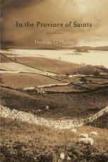A Grim World
If Thomas O’Malley’s first book, In the Province of Saints, is anything to judge by, he has a real future ahead of him as a novelist. The story takes place in Ireland, more specifically in the southern part, between 1976 and 1981. But geography, alas, does not spare his characters from “the troubles” of the North nor from the miseries of rural life long before Ireland became the Celtic Tiger.
Like many first novels, this one has the ring of autobiography about it; and indeed, the central character, the young boy Michael McDonagh, is also the narrator. It opens and closes with a freak snowstorm, a tip of the hat perhaps to James Joyce’s primordial one in “The Dead,” but fiercer and more foreboding. For with the snow comes a death that will haunt all the main characters. Mag Delacey has died after a long illness, and her death revives all the rumors of a long affair between her and Michael’s father, Padraig, who has left Ireland temporarily, like many others, to work “the construction” in the States. When he returns five months later, his wife confronts him emotionally with the charge, which he dismisses as small-town rumor. Michael is left wondering.
To complicate matters, Michael’s mother, Moira, is suffering herself from a recurrent illness that often leaves her bedridden for days at a time, putting an added burden on him and his young sister, Molly. Only later do we learn that she has cancer. Also, Michael’s dog has been attacking a neighbor’s sheep, the very neighbor Padraig had savagely beaten after he had alluded in the pub to the affair with Mag Delacey. Padraig is forced into indentured servitude to Flaherty, who takes perverse delight in humiliating him at every turn. Not surprisingly, Padraig soon returns to the States.
Thus is set the pattern for the rest of the novel: long periods of an absent father when Michael turns to several male surrogates of varying quality as he tries to hold his small family together and at the same time deal with his growing attraction to Cait Delacey, daughter of the dead woman his father had supposedly romanced. And all of this in a small town where everyone knows one another’s business: a sure formula for disaster.
When his father does return again, it is to bury his twin brother Rory, the other half of himself. Several relatives come with him and there is the traditional wake, but Padraig is inconsolable. He feels guilt at surviving and cradles his twin’s accordion, refusing to let anyone play it. Later Michael will break the instrument in anger, because his father’s love for his twin seems to outweigh his love for him; he then packs it up again, hoping his father will never discover his treachery. He almost does once, but happily for Michael, he cannot even bring himself to open the case. The emotional tangle grows more tense between them.
Meanwhile, his mother, Moira, pursues her own vendetta against the parish priest, a County Cork man whom no one likes; she shows up for Maundy Thursday to have her feet washed, having walked through smelly bogs and cow dung beforehand to show her contempt, though she insists that the children attend Mass every Sunday.
And in the background the steady drumbeat of violence in the North infects the whole community, many of whom sympathize strongly with the Catholics there—and some go much further.
As if that were not enough, there is the underworld of poaching on the local river where Brendan, another of Michael’s uncles, calls the shots. One of his targets is the hapless Lugh, an itinerant laborer who befriends Michael but runs afoul of Brendan. On the water one night, tending to the eels he collects for spending money, Michael hears a commotion and a splash. When the other boat moves on, he dredges up Lugh’s body and is overcome with grief and fear.
The Ireland these characters inhabit is a long way from the travel brochures and the cheery postcards we associate with the country, but it is also far removed as well from the rural Donegal I have visited quite often. The poverty is more prevalent, and the violence more pronounced. Still there is no denying that the late 1970’s and early 1980’s were an exceptionally violent period in Ireland for many—and not just those in the North.
In the end Michael finds a way to avenge Lugh’s death, but at a great cost. “I’m an informer,” he admits to himself, the worst epithet known to the race. But in the process he also redeems himself and sets his path, like his father and so many before him, for exile and, I think we can speculate, for the life of a writer, like Joyce before him.
This article also appeared in print, under the headline “A Grim World,” in the December 12, 2005, issue.








